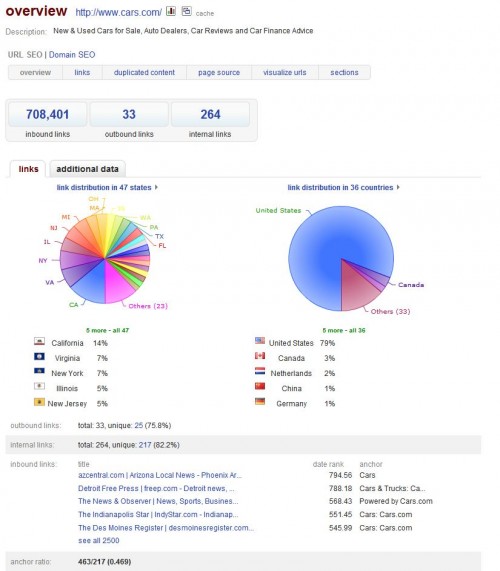Blekko: New Search Engine Lets You “Spin” The Web
Did you think the search engine wars had devolved into a fight between only Google and Bing? Think again. New challenger Blekko is stepping into the fray, opening to limited beta testing today. It offers a compelling way to “slash the web” and put a particular spin on your search results. Blekko isn’t a Google-killer. […]
Did you think the search engine wars had devolved into a fight between only Google and Bing? Think again. New challenger Blekko is stepping into the fray, opening to limited beta testing today. It offers a compelling way to “slash the web” and put a particular spin on your search results.
Blekko isn’t a Google-killer. Nor is Blekko positioning itself that way. But Blekko’s “slashtags” are a unique feature that may draw you in on occasions when you want to see how search results look when they’re skewed to a particular viewpoint.
“We’re there for searches you can’t do elsewhere,” said Michael Markson, vice president of marketing for Blekko. “Every time you search the conservative web, we want to do that search. Or the green web, and so on.”
Slashtags: Spinning Your Search Results
What would rank number one for “honey” if you asked bakers versus beekeepers? Blekko can give you the spin from both groups. Want your search results with a liberal slant? You can do that at Blekko, or slash your results the opposite way for a conservative view.
This is all done using slashtags, special keywords that you place after what your searching for, in order to indicate the viewpoint you want used to spin your results. Blekko maintains over 250 slashtags (the full list, for those in the beta, is here), including viewpoints such as
- /beer
- /christianity
- /green
- /startrek
Slashtags In Action
Let’s see some slashtags in action. Want web sites discussing BP but with a liberal slant? Do this (note: the link and several others below only work for those in the beta):
That’s a search for BP, as you might do on Google, followed by the slashtag indicating a liberal viewpoint: /liberal. It return back sites like the Huffington Post or Mother Jones:
Want a conservative view? Then do:
You get Fox News topping the list:
Want to see the latest stories from “green” web sites? Then you can use the green slashtag along with the date slashtag, like this:
That gives you the latest posts from web sites that Blekko has tagged as being green:
Slashtags, Viewpoints & Vertical Search
So far, I’ve referred to slashtags as being synonymous with viewpoints. More correctly, each slashtag represents a collection of web sites on a particular topic.
When you search using the /liberal slashtag, you’re running your search against all the pages that Blekko has found from over 70 web sites that have been categorized as liberal. In effect, you’re searching the “liberal” web, or a least a select subset of the liberal web.
This is also known as a vertical search, where instead of searching across the entire “horizontal” spectrum of all web sites, you’re searching “vertically” through just one slice.
There’s no doubt that vertical search can be useful. Anyone who’s searched for images using regular Google but then tried Google Images understands this. If you want images, using a search engine designed to bring back only images eliminates much of the clutter. Similarly, using something like Google News works much better than regular Google, if you’re after news content. That’s because Google News lets you search only against news resources.
Don’t Look For Slashtags At Google & Bing
While Google offers vertical search in key areas, as does Bing, neither approaches the wide-range of topics that Blekko offers. There’s no “liberal” or “conservative” or “green” search you can do, as in the examples above.
So what. Are all these specialty filters that useful? Sure, they can be.
Two years ago, IAC (which owns Ask.com), rolled out RushmoreDrive, which was designed to give an African-American spin to web search results. The site has long since died, but I remember one classic example that highlighted how it might have worked better for African-Americans than Google. This was in a search for “US national anthem.”
For that search, Google makes no mention of “Lift Every Voice And Sing,” also known as the “Black National Anthem.” When I did this search back when Rushmore Drive operated, that alternative anthem was mentioned — and may have indeed been relevant to African-Americans (or anyone else) who wanted to see an African-American view of search results.
That’s the promise of Blekko, the ability to apply a viewpoint to search results in a way that’s impossible at the major search engines. While Blekko doesn’t offer an African-American topic yet, it could in the future, or anyone can create one, as I’ll come back to in a moment.
Slashtags At Blekko Aren’t Perfect
Promise isn’t always reality, of course. It’s fairly easy to do slashtag searches on Blekko that don’t do better than Google.
For instance, twitter /chess on Blekko brought up so-so results. In contrast, searching for twitter chess on Google brought up a really nice set of matches, including listing the interesting ChessTweets site first, something Blekko completely missed.
In the Google search, looking for “twitter chess” doesn’t cause it to search only through a subset of sites that are identified as being about chess, as is the case with Blekko. Instead, Google’s searching across the entire web to find any pages that seem relevant to both those words. That’s also why Google succeeds better than Blekko, in that case. ChessTweets isn’t on Blekko’s /chess list, so it gets missed.
And Blekko Knows It’s Not Perfect
Beyond slashtag searches, Blekko can have relevancy issues with its “regular” results. For example, a search for california without any slashtags applied is dominated by links to various California-based universities. In contrast, the same search at Google is much more balanced in terms of listing sites that cover California as a whole.
Blekko readily acknowledges that it has imperfections. That’s one reason why it is only allowing a select number of people in to its beta (more on how to get in below). It knows they’ll find problems, both with how the site works as well as with the relevancy there. But after about three years of development, it was also deemed time to get something out there.
“This is just the beginning. We wanted to put out a base set of features, but we can think of lots of ways to work with our users to improve search,” said Blekko CEO Rich Skrenta.
More About Slashtags
So far, I’ve mostly mentioned the “topic” slashtags that Blekko offers. Blekko also offers what it calls “built-in” tags, some of which can confusingly sound like topic tags. For instance:
- /people
- /news
- /blogs
- /forums
Those all bring back matches from sites that are associated with a person, are news sites, are blogs or forums respectively. The difference from topic tags such as /techblogs? It’s mainly that you can’t drill down and see exactly what sites that Blekko is searching against, as you can with the topic tags.
There are also built-in tags that pull back information from third-party sources, such as maps (/map), shopping results from The Find (/shop) or which allow you to bring in results from other search engines such as Bing (/bing), Yahoo (/yahoo) and even Google (/google).
By the way, for those who miss the “two column” format that all the major search engines offered until recently, Blekko offers a solution. Like the majors, it has a three column format, but you can change this to two columns by using the “prefs” link next to the search box and selecting “hide the left column.” Do that, then do a search for anything along with /google, and you’ll have Google results in a two column format.
As mentioned, people can also create their own slashtags. These “user slashtags” can be on any topic, using any set of sites a particular user wishes to define. For example, I made a /seosites slashtag that allows anyone to search and get results back from sites we list as resources on our What Is SEO page.
In the future, it might get easier to create user slashtags. For example, you might be able to select only a few sites and then have Blekko learn other sites that should be included, based on linkage and other data, the company told me.
There are also three special “built-in” slashtags that filter results in ways other than by topic:
- /noporn
- /date
- /rank
The first is designed to keep porn sites out of your results. The second ranks results by date. The third? That’s designed to get anyone involved with search engine optimization drooling.
Revealing The Ranking Algorithm
Ever wonder why a search engine ranks a particular site over others? It’s all down to a ranking “algorithm,” a recipe of adding up various factors such as the words on a web page, how people link to the web page, the importance of those links and more to decide who “wins” and should show up in the top results.
Search engines like Google and Bing do explain some of the key factors in their ranking algorithms, but Blekko takes things to an entirely new level with the /rank slashtag.
Consider this search for cars /rank:
In it, I can see the final score that was assigned to each listing, to determine why it ranked where it did. I’m also told broadly whether the site ranks because of domain factors (is the word in the domain name?), anchor factors (is the word in the anchor or link text pointing at the page?), title factors (is the word in the page’s HTML title tag?) and URL factors (is the word in the page’s URL?).
That’s just a summary. You can drill-down into even more depth:
Now you can see other factors being considered (the screenshot above only shows some of them), such as if the page is at the top level of a web site, if keywords are used with H1 headers and other criteria.
But wait, there’s more! When you search for any topic, even without using /rank, you can easily discover ranking data for a particular page. For example, here’s a search for cars again:
See the two arrows? The “links” one brings back a backlinks report, while the “seo” one brings back a screen like this:
There’s much, much more that you can drill down into, enough for a separate article in the future. Using the “Visualize URLs” feature, you can even compare four different sites to each other
Blekko had considered if it should refine its reporting to make it a paid service for SEOs but decided instead to stick with what it shows as a way of being more transparent about how it works behind the scenes.
“Our primary purpose is to be open in how it works,” said Skrenta. “It might be the case that in the future, we’ll provide an API for people who want to build tools further on our data.”
It’s important to remember that Blekko’s SEO data isn’t a guide to the inner working of Google or Bing. Those search engines rank things according to their own unique algorithms, based on their own indexes of the web. But Blekko’s data still might still be useful to some who are trying to diagnose how they might be lacking on the SEO front in general.
Speaking of indexes, Blekko has about 3 billion documents recorded, it says. The major search engines no longer report index size (which is a good thing), but Google, Bing and Yahoo will be in tens of billions of documents indexed range. That means they’ll be much more comprehensive than Blekko for very specific searches. To compensate, Blekko taps into Yahoo’s large database of web pages for times when it can’t find a match.
Aiming To Be Number Three
Can Blekko win in the search space? One long-time search veteran — a cofounder of the Open Directory, a cofounder of the Topix news search engine — certainly thinks anyone taking on Google is crazy:
Google has won both the online search and advertising markets. They hold a considerable technological lead, both with algorithms as well as their astonishing web-scale computing platform. Beyond this, however, network effects around their industry position and brand will prevent any competitor from capturing market share from them — even if it were possible to match their technology platform.
That’s Blekko own Rich Skrenta, writing about challengers to Google back in 2007. But just months after that, Skenta had a change of heart, penning a How To Beat Google piece with advice. And by early 2008, he dived in an founded Blekko.
So does he hope to beat Google, despite his earlier prediction that no one can?
“We want to be number three. That’s our goal. Before you can kill Google, you must kill Ask.com. Or even AltaVista,” Skrenta said.
Ask.com has about 2% to 4% of the US search market, depending on how you count things (Ask.com itself powers associated sites in the IAC-Ask network like MySearch).
To reach the number three spot, Blekko would have to generate around 600 million searches per month. So far, no other search start-up in recent years has come close to those levels — and Blekko itself isn’t aiming to get there immediately. The goal is to reach 30 million searches per month initially, or 360 million searches per year. That would put Blekko well beyond the 150 million searches per year mark where it feels it would be successful financially, as a start-up.
That also means that eventually, ads would come. Currently, Blekko doesn’t have them. When they are added, they’ll probably be powered by a third party source. As business develops, Blekko might build its own ad platform.
The Little Start-Up That Could?
And for the immediate rollout, which starts today, Skrenta has a very simple goal, to be the search start-up that succeeds.
“We don’t want to do a Cuil. We’d like to survive our launch and start attracting some users,” Skrenta said.
That’s a reference back to the last big search start up to enter the space, Cuil, which had a “bigger is better” pitch when it debuted in July 2008. But in short order, Cuil’s results were found to be lacking in relevancy, generating much negative publicity.
Last year’s big search start-up, Wolfram Alpha, has fared better. It’s far from the revolutionary Google-killer that some hyped it to be. It’s unclear if it’s generating profits against what appears to be a huge outlay in human curation. But it does fill some niches that the other major search engines like Google do not.
Blekko, with its slashtag-spinning of web search, has the opportunity to fill a niche of its own. It’s definitely worth a visit, and revisit, even in its rough state.
Want to try it. I’ve got 25 invites to give out. Comment below, say you want an invite, and I’ll send that to the email address associated with your account. You can also visit the Blekko home page, where it has instructions on how to get an invite by liking them on Facebook, following them on Twitter or sending them a tweet.
Also see Google, Content Farms & Why This May Be Blekko’s Moment from Search Engine Land’s Greg Sterling, for a different take on Blekko from earlier this week.
From TechCrunch, there’s also a screencast of Blekko in action, along with an interview with cofounders Skrenta and Markson:
Postscript: Blekko has now opened to the public. See Blekko, The “Slashtag” Search Engine, Goes Live.
Contributing authors are invited to create content for Search Engine Land and are chosen for their expertise and contribution to the search community. Our contributors work under the oversight of the editorial staff and contributions are checked for quality and relevance to our readers. The opinions they express are their own.
Related stories






